Studying for a standardized test can be like navigating the Amazon River by yourself. It’s possible to do it on your own—but at some point, you’re probably really going to wish that you had a guide. Lucky for you, finding an ACT study guide online is (slightly) easier than going down the Amazon! While finding the right ACT test study guide may seem overwhelming, given all the material that’s out there, we have the perfect resources to help you navigate those muddy waters of ACT prep! So let’s start our journey by taking a look at Magoosh’s ACT prep study guide and what you can expect to find in it.
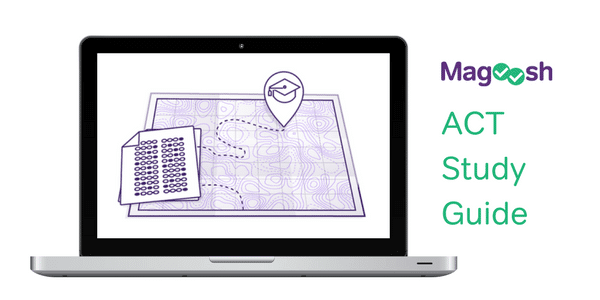
Table of Contents
- The Magoosh ACT Study Guide eBook
- ACT Test Study Guide (One Month Schedule)
- ACT English Study Guide
- ACT Math Study Guide
- ACT Reading Study Guide
- ACT Science Study Guide
- ACT Writing (Essay) Study Guide
- ACT Prep Study Guide Resources
- A Final Word
The Magoosh ACT Study Guide eBook
Why do you need a guide to the ACT? In the first place, it can be intimidating to approach a 3+ hour exam without having a sense of what’s on it. In the second place, gathering together strategies and refreshing your knowledge of content will give you the best chance of reaching your goals for the test.
But with so much material out there, what should you look for in a good ACT study guide? The best ACT test study guides will:
- Provide you with a clear overview of the exam, explaining what you’ll encounter on test day;
- Explain how to use the test’s logistics (scheduling, timing, format) to your advantage;
- Introduce you to the material (content) the ACT tests, before giving you an in-depth look at the different sub-content areas the exam may ask about;
- Teach you strategies you can use, both in each section and on the test as a whole, to get your highest possible score.
If that seems like a tall order, good news! You can find all this and more in our ACT eBook.
And best of all? It’s free!
What makes the Magoosh ACT Test Study Guide so special? Other than all the awesomeness I’ve already listed above: the study guide is comprehensive; it’s great for students at all levels, aiming for all kinds of scores; and, more than anything, it’s fun!
So what are you waiting for? Download the Magoosh ACT Study Guide now, and let’s go through how you can make the most of our expert advice with ACT test study guide schedules, calendars, checkpoints, and summaries, ensuring that you get the maximum benefit possible out of the study guide!
ACT Test Study Guide Schedules
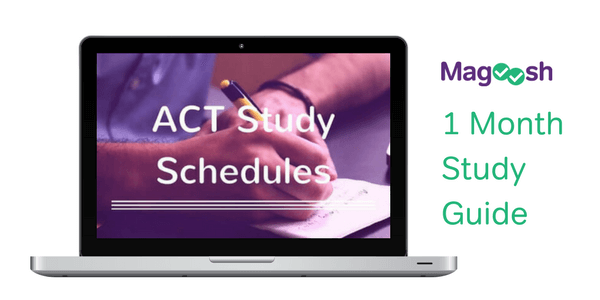
So, what next?
Go ahead and skim through the eBook if you haven’t already. Spend a minute or two orienting yourself with the Table of Contents and take note of the format, resources, and key concepts we’ve included.
Using the Magoosh ACT Study Guide
It can be tempting to try to get through it all in one go. If your test is tomorrow, go for it—you have nothing to lose! But if you have a little more time for your ACT prep, know that smarts and strategy will win this race. Even with the best study guide, it still can be hard to know the best way to approach your prep.
With that in mind, we’ve created a One Month Calendar to show you how to get the most out of your ACT exam study guide!
| Week | Sunday | Monday | Tuesday | Wednesday | Thursday | Friday | Saturday |
|---|---|---|---|---|---|---|---|
| 1 | Study Day 1: Intro & Math (1 hr) ACT structure, timing & strategies (1 hr) Review ACT Math test concepts (15 mins) Review math formulas list = Total: 2 hrs 15 mins |
Study Day 2: English and Science (1 hr) English video lessons (20 mins) English practice questions (15-30 mins) Start error log (35 mins) Science video lessons (35 mins) 40 Science questions (15-30 mins) Update error log = Total: 3 hrs – 3 hrs 30 mins |
Study Day 3: Reading, Science, and Essay (30 mins) Video Reading lessons (35 mins) 40 Reading questions (15-30 mins) Update error log (35 mins) Science practice questions (15-30 mins) Update error log (1 hr) Writing lesson videos and practice = Total: 3 hrs 10 mins – 3 hrs 40 mins |
Practice Test | |||
| 2 | Review Practice Test | Study Day 1: Math (30-60 mins) Math video lessons (25 mins) 25 Math questions (15-30 mins) Update error log (40 mins) Math practice questions (15-30 mins) Update error log = Total: 2 hrs 5 mins – 3 hrs 5 mins |
Study Day 2: Science and English (30 mins) Review Science topics (25 mins) Science video lessons (30 mins) Science practice questions (15-30 mins) Update error log (35 mins) English video lessons (30 mins) 45 English questions (15-30 mins) Update error log = Total: 3 hrs – 3 hrs 30 mins |
Study Day 3: Reading and Essay (35 mins) Reading lesson videos (30 mins) Reading practice questions (15 – 30 mins) Update error log Optional: (45 mins) Reading questions (30 mins) Writing lesson videos (40 mins) Practice essay = Total: 2 hrs 30 mins – 3 hrs 30 mins |
Practice Test | ||
| 3 | Review Practice Test | Study Day 1: Science (25 mins) Science lesson videos (35 mins) Science test (15-30 mins) Update error log (35 mins) Science test (15-30 mins) Update error log = Total: 2 hrs 5 mins – 2 hrs 35 mins |
Study Day 2: Math (30-60 mins) Math lesson videos (60 mins) Math practice test (15-30 mins) Update error log (60 mins) Math test (15-30 mins) Update error log = Total: 3 hrs – 4 hrs |
Study Day 3: Reading (25 mins) Reading video lessons (35 mins) Reading test (15-30 mins) Update error log (35 mins) Reading test (15-30 mins) Update error log = Total: 2 hrs 5 mins – 2 hrs 35 mins |
Practice Test | ||
| 4 | Review Practice Test | Study Day 1: English (60 mins) English lesson videos (30 mins) 40-50 English questions (15-30 mins) Update error log Optional: (45 mins) English test (15-30 mins) Update error log = Total: 1 hr 45 mins – 3hrs 15 mins |
Study Day 2: Science and Math (25 mins) Science lesson videos (35 mins) 30-40 Science questions (15-30 mins) Update error log (35 mins) 40 Science questions (15-30 mins) Update error log (35 mins) 40 Math questions (15-30 mins) Update error log = Total: 3 hrs 20 mins – 3 hrs 35 mins |
Study Day 3: Final Review (1 hr) Review error log and make “cheat sheet” (30 mins) Review ACT Tips for Test Day and pack your bag Relax and go to bed early! = Total: 1 hr 30 mins |
ACT Test Date! |
If you want a printable copy of this calendar, download the One Month Study Calendar PDF.
Making Progress with the ACT Exam Study Guide
As you study for the ACT exam, and work through all those ACT prep questions, you may find that you’re struggling to measure your progress. Should you amp up your practice before the big exam, or are you on track to get your dream score?
Take a look at our Weekly Checkpoints for the One Month Study Schedule to follow your progress and ensure that you’re on the right track.
To use the checkpoints, simply copy the following information into a notebook at the end of each week, after you’ve taken an ACT practice test. Or, if you prefer, you can print the PDF version of the checkpoints and track your progress directly on that paper. If you’re going the printer route, make sure to print four copies so you have one for each week of the ACT Study Guide!
| Question Type | Correct Answers | Incorrect Answers | Total Questions | Accuracy (Correct/Total) | This week, I’ll work on… | ||
|---|---|---|---|---|---|---|---|
| English (overall) | |||||||
| English: Usage and Mechanics (overall) | |||||||
| English: Usage and Mechanics: Grammar and Usage | |||||||
| English: Usage and Mechanics: Punctuation | |||||||
| English: Usage and Mechanics: Sentence Structure | |||||||
| English: Rhetorical Skills (overall) | |||||||
| English: Rhetorical Skills: Strategy | |||||||
| English: Rhetorical Skills: Organization | |||||||
| English: Rhetorical Skills: Style | |||||||
| Math (overall) | |||||||
| Math: Pre-Algebra | |||||||
| Math: Elementary Algebra | |||||||
| Math: Intermediate Algebra | |||||||
| Math: Coordinate Geometry | |||||||
| Math: Plane Geometry | |||||||
| Math: Basic Trigonometry | |||||||
| Reading (overall) | |||||||
| Reading: Detail | |||||||
| Reading: Main Idea | |||||||
| Reading: Comparative Relationships | |||||||
| Reading: Cause-Effect Relationships and Sequence of Events | |||||||
| Reading: Inferences/Generalizations | |||||||
| Reading: Meanings of Words | |||||||
| Reading: Author’s Voice, Method, or Purpose | |||||||
| Science (overall) | |||||||
| Science: Detail | |||||||
| Science: Pattern | |||||||
| Science: Inference | |||||||
| Science: Scientific Method | |||||||
| Science: Compare and Contrast |
If you want a printable copy of these checkpoints, download the Weekly Checkpoints PDF.
Adapting the Study Guide for the ACT to Your Schedule
It’s important to note that you don’t have to use the Magoosh Study Guide for ACT in just one month. Some students find that they want to devote more time to their ACT studies. That’s great! What counts as efficient ACT prep can vary from person to person.
Keep in mind that, combined with the resources we mention in the ACT Study Guide 2016-2017, you can adapt the above calendar to suit your own schedule. You can also find advice for One Week, Two Month, and Three Month ACT Study Schedules right here on the Magoosh High School Blog!
Next up, let’s look at study guides for each ACT test.
ACT English Study Guide
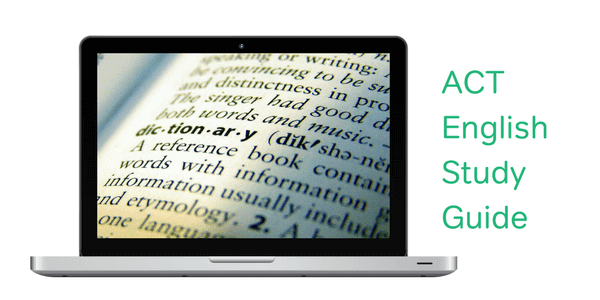
What’s the first thing you’re going to see when you open that test booklet on the official exam? Well, after all the administrative stuff, you’ll see the ACT English test. Here’s what it will look like and how to get the most out of the ACT English Study Guide!
The Format of the ACT English Test
The ACT English test is 45 minutes long and, as we’ve seen, the first section of the ACT. Within that time frame, you’ll answer 75 multiple-choice questions—that’s more than one a minute!
With that kind of time pressure, you’re not going to want to waste precious seconds figuring out what a question’s testing you on. With that in mind, let’s take a look at…
What to Study for ACT English
As you work through the ACT Study Guide, you’ll see that the 75 English questions fall into only a few categories. To make your ACT English practice easier, let’s divide them into two categories and six subcategories:
- Usage/Mechanics
- Grammar and Usage
- Punctuation
- Sentence Structure
- Rhetorical Skills
- Strategy
- Organization
- Style
Suggested Resources for ACT English Practice
Within the Magoosh ACT Study Guide, you’ll find the English section covered from pages 57-103. If you’re still craving ACT English practice, check out more resources on the Magoosh ACT English page!
It’s also important to note that ACT testmakers published the Real ACT Prep Guide (4th Edition), also known as the “Red Book.” And while this book does have its flaws, the fact that it’s written by the official testmaker makes it a valuable resource. The same can be said for the free practice you can find on the ACT website.
ACT Math Study Guide
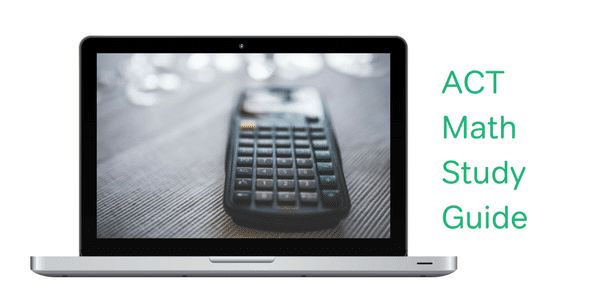
After the ACT English test, you’re going to have to switch gears pretty quickly, because here comes ACT Math! While the math test covers a variety of topics, don’t let it make you nervous. With the right preparation, you can get enough ACT math practice under your belt to feel nothing but confidence on test day.
The Format of the ACT Math Test
The second test (section) of the ACT, the ACT Math test throws 60 questions at you and gives you 60 minutes to answer them. While that’s more time per question than the ACT English test gave you, most students will still feel the time crunch. You can use a calculator on the exam, but make sure it’s an approved one!
And what will you be looking at during that hour?
What to Study for ACT Math
On the surface, ACT Math only covers six concept areas. However, each of those areas (Pre-Algebra, Elementary Algebra, Intermediate Algebra, Coordinate Geometry, Plane Geometry, and Basic Trigonometry) could take an entire semester to master.
So, more specifically, what will you see on the ACT Math test?
- Pre-Algebra: decimals, fractions, integers, positive and negative numbers, square roots, scientific notation, factors, ratios, proportions, percents, charts and graphs of statistics
- Elementary Algebra: exponents, evaluating algebraic expressions through substitution, using variables to express relationships, algebraic operations, and factoring quadratic equations
- Intermediate Algebra: quadratic formula, rational and radical expressions, absolute value equations and inequalities, sequences and series, systems of equations, quadratic inequalities, functions, matrices, roots of polynomials, probability, and complex numbers
- Coordinate Geometry: evaluating points and lines on a graph, polynomials, circles and other curves, graphing inequalities, slope, parallel and perpendicular lines, distance, midpoints, and conics
- Plane Geometry: angles and relationships among perpendicular and parallel lines, properties of circles, ellipses, rectangles, triangles, parallelograms, trapezoids, transformations, area, volume, three-dimensional geometry
- Basic Trigonometry: trigonometric relations in right angles, values and properties of trig functions, graphing trig functions, using trig identities, solving trig equations
Whew!
Suggested Resources for ACT Math Practice
First of all, you’ll find ACT Math in the Magoosh ACT Study Guide on pages 104-202. (I know it looks like a lot, but trust me—it’s fun, and it’s a great way to cover alllll those topics we just looked at.) For more practice and tips for the math test, you can also check out Magoosh’s ACT Math page.
Finally, it’s really important to keep in mind that, unlike the SAT exam, the ACT does not provide students with any math formulas. With that in mind, we created this Math Formulas on the ACT PDF for you to use as a handy-dandy study guide (just be sure to wean yourself off of it well before the test)!
ACT Reading Study Guide
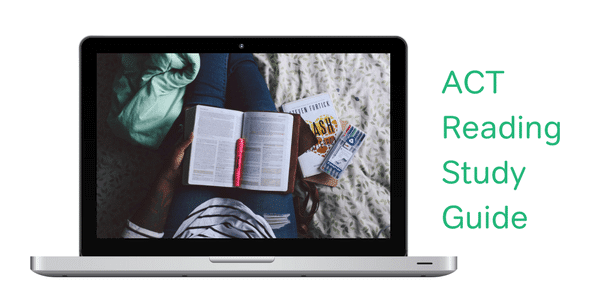
Hold onto your hats, because we’re rapidly switching gears again: this time, from Math to Reading. I know, it would be awesome if all the English, Reading, and Writing were together and the Math and Science were back-to-back…sigh. That’s not the case. Enough dreaming! Let’s look at the reality.
The Format of the ACT Reading Test
The time pressure here seems to be a little lighter than on English test—at first. Yes, there are only 40 questions to answer in 35 minutes, but keep in mind that those 40 questions are about 4 passages, which can be lengthy and take some time to read.
What to Study for ACT Reading
As you start your ACT Reading practice, you’ll soon realize that the genres of the passages that you’ll see (fiction, social science, humanities, and natural science) are less important than the types of questions that accompany those passages. So what are those question types?
- Detail: questions that ask you to find a detail in the text.
- Main Idea: questions that ask you to determine the primary message of a paragraph, section or entire passage.
- Comparative Relationships: questions that ask you to compare two or more people, viewpoints, events or theories.
- Cause-Effect Relationships and Sequence of Events: questions that ask you to determine what caused something else or what is the effect of something in the passage.
- Inferences/Generalizations: questions that require you to synthesize information and boil it down to a more concise form.
- Meanings of Words: questions that ask you to determine the meaning of a word in context.
- Author’s Voice, Method, or Purpose: questions that ask you to draw conclusions about the author’s point of view and method; basically how a passage is developed or its purpose.
While that might not seem like a lot, it can take a lot of Reading practice to determine exactly how to identify which types of question you’re working on and how to answer it. But don’t worry! Because we can offer…
Suggested Resources for ACT Reading Practice
To learn more about Magoosh ACT Study Guide for Reading, scroll on over to pages 204-220 of the eBook Study Guide. You can find more practice in the Magoosh ACT Reading blog posts, as well as in the “Red Book” and on the ACT website.
What is the best thing you can do, outside of practicing and practice testing? Read on your own time! Read for fun, read for information, read for a higher test score—as long as you’re reading, you’re helping your ACT Reading score.
ACT Science Study Guide
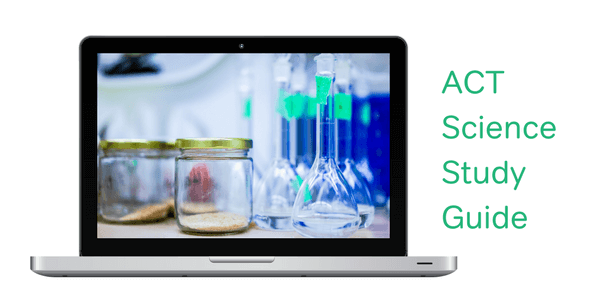
Our fourth and last (required) test on the ACT is, yes, ACT Science. As you practice and work your way through the Magoosh ACT Study Guide for Science, remember that the Science test is all about reasoning. While familiarity with basic science terms is necessary, you don’t need to have a Nobel Prize (or AP test) under your belt to ace this section!
The Format of the ACT Science Test
Like ACT Reading, the ACT Science test will give you 40 questions to answer in 35 minutes—that’s just under than one minute per question. Unlike ACT Reading, you’re going to get a lot of different passages: expect to find 6 to 7 in ACT Science.
The good news is that these passages are shorter and more visual than Reading passages (think lots of charts and graphs). So, there’s definitely a big distinction between the science-based ACT Reading passage and the reading passages in the ACT Science test.
What to Study for ACT Science
Don’t spend your time boning up on tiny details from advanced physics courses (at least, not for the purposes of the ACT). Instead, work on interpreting charts and graphs, reading science articles for non-specialists, and practicing ACT-specific materials. That way, you’ll be able to recognize and master the following question types:
- Detail: questions that ask you to find a specific data point on a graph, table, diagram, etc. and report the answer.
- Pattern: questions that ask you to predict a trend or relationship among the given data, generally by finding a point between existing data points or continuing to follow a trend beyond existing data.
- Inference: questions that ask you to draw conclusions from the data, sometimes combining information from multiple figures or experiments, and sometimes evaluating how new information would affect the experiment.
- Scientific Method: questions that ask about how experiments are designed, or how experimenters test and interpret data.
- Compare and Contrast: questions that only appear on the “Conflicting Viewpoints” passage and ask you to compare various aspects of opposing hypotheses on a scientific phenomenon, or explain how additional information might affect the various arguments presented.
Suggested Resources for ACT Science Practice
To put those question types in context, take a look at some ACT Science practice passages! To find Magoosh’s Science Study Guide, turn on over to pages 221-244. The Magoosh blog is also a great place to find tips and tricks for the ACT Science test. The “Red Book” is also strong in this area.
ACT Writing Study Guide (Essay)
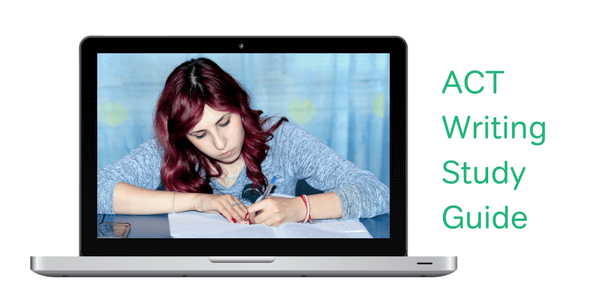
A quick note: The ACT essay is optional, but some colleges require it for admission. So check the admissions requirements of the schools you’re applying to. And, if you don’t yet know where you’re applying, it’s a good idea to sign up for the essay.
A lot of students balk at preparing for the ACT Writing test (otherwise known as “the essay”). These students often get stellar grades in their English classes, so you’d think they’d embrace this section. Instead, they think that their great English class essays will translate to a great ACT essay score.
This is not necessarily true! It’s really important to remember that the ACT Essay is unique. What gets you high grades on your essays for school may not get earn high scores on the ACT.
So what will? Let’s take a look at the format of the test first, then see how you can use that format to get your best score on the ACT Writing test.
The Format of the ACT Essay
The ACT Writing test provides you with a prompt and gives you 40 minutes to write an essay response. The prompt consists of a debatable topic and three different perspectives on that topic. ACT asks you to evaluate those perspectives, provide your own, and explain the relationship between your opinion and those provided.
What to Study for ACT Writing
If writing English class essays doesn’t prepare you for the ACT Writing test, then what does?
Though your prep for this section will necessarily be different than your preparation for the others, there are a few specific skills that can help you score well:
- 5-Paragraph Essays, particularly how to structure them;
- Choosing Examples—and then using them well;
- Brainstorming and related note-taking;
- Proofreading, particularly proofreading your own work.
Suggested Resources for ACT Writing Practice
These might seem like difficult concepts to practice, and they can certainly be tricky to grasp at first if you’re working on your own. Lucky for you, we’re here to help! For more info on ACT Writing, check out pages 244 to 257 of the eBook and Magoosh’s ACT Writing posts.
ACT Prep Study Guide Resources

Want more ACT prep resources to add to the hundreds of pages of strategies and practice in the Magoosh ACT eBook, and the thousands of posts from our experts on the High School Blog?
If you’re looking to flesh out different aspects of your own personal ACT Test Study Guide, then you probably do. We’ve got you covered:
- Free ACT Practice Test with Answers and Explanations (PDF Download)
- This full-length ACT practice test contains over 200 of Magoosh ACT’s best practice questions. Use it as your practice test during any week of the Magoosh One Month Study Guide, then watch the free Explanation Videos for all the questions you missed. It’s the perfect way to learn from your mistakes and increase your score!
- How to Take & Review Your ACT Practice Test
- Before anything else, I highly suggest you learn how to use full-length ACT practice tests to your advantage while prepping for the ACT.
- Magoosh ACT Mobile Apps
- I can’t recommend our free ACT apps highly enough! Both the Magoosh ACT Flashcard App and Magoosh ACT Lessons App are available for Android and iPhone. They’re perfect for studying on the go.
- ACT Prep Book Reviews 2016-17
- If you’re thinking about getting an ACT prep book, don’t miss our evaluation of the best ACT books currently on the market. It’ll help you save time and money!
- ACT Raw to Scaled Score Conversion Chart
- Finally, if you’re taking a practice tests as part of your ACT Study Guide (and you definitely, definitely should!) you’ll need the ACT Raw Score Conversion Chart, as well as the Ultimate Guide to ACT Scoring to help you put them in context.
And don’t forget about Magoosh ACT Prep! See if it’s right for you by signing up for our seven-day free trial (no credit card info needed).
A Final Word

In the end, learning how to study for ACT comes down to learning the test format, the scoring system, and how to practice—and then practicing, practicing, practicing!
Do your best to regularly evaluate your work, make sure your practice is consistent, and stay strong. The fact that you’re this invested in your ACT success is a great sign that you’ll do well.
Good luck, ACT test-takers!

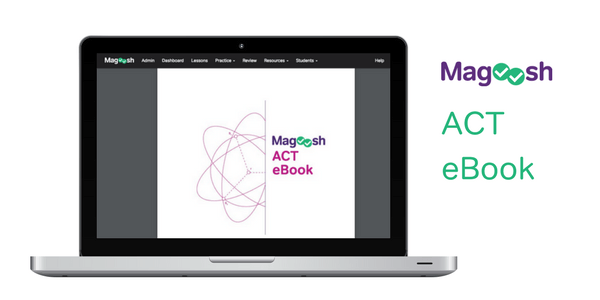
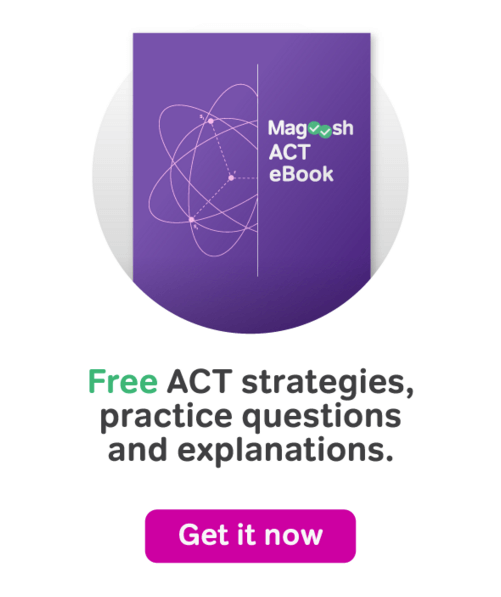
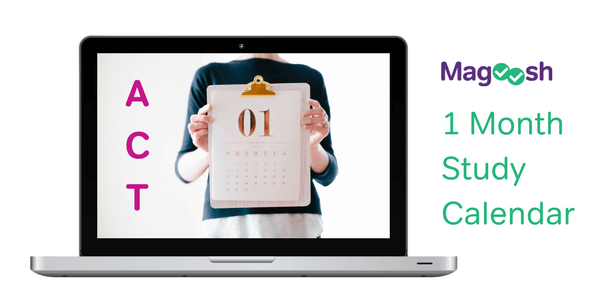
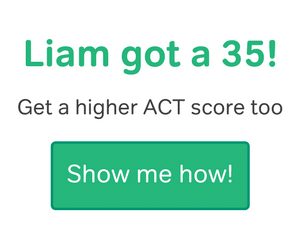



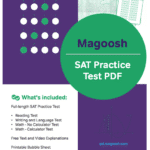

Leave a Reply